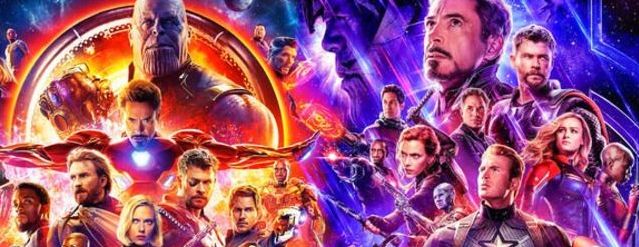Why Avengers: Endgame Supports Knowledge-Led Curricula
WARNING: the following blog contains full, gigantic spoilers for Avengers: Endgame and all preceding films. Do not read it if you don’t want to know intimate details about the plot of these films.
—–
The idea of cultural literacy can sometimes be hard to explain. The idea that the more we know, the more we appreciate the world around us is a fairly simple one, but relating it to knowledge-led curricula, particularly in a world where we all have the internet at our fingertips, can often be a challenge – at least compared to those on the other side, who simply have to say ‘why do I need to know this when I can just Google it?’
I think perhaps the most compelling argument, the one that really stirs the soul, comes through the arts. When you understand a reference in a film, game, book or song, it makes the experience just that bit more pleasurable, enhancing your connection with the art in hand.

This can be seen everywhere. The realisation that The Lion King is actually a retelling of Hamlet gives the story a deeper meaning; likewise West Side Story and Romeo & Juliet.
The art can be enjoyed on its own, but it reaches deeper, more meaningful levels when it is connected with other aspects of our culture, even within its own canon. Red Dead Redemption 2 is brilliant in its own right, a true masterpiece – but the depth of these characters, and the weight of their journeys, is enhanced when you know their fates from the original game. Birdsong is a moving book by itself, but when you realise it is part of a trilogy you see even more within it. The Star Wars prequels… well they’re trash, but they’re slightly less trash if you already have an appreciation of these characters from their future paths.
This argument struck me forcefully as I sat in an Uber on the way back from the midnight showing of Avengers: Endgame. Here was something unprecedented: never has a series of films been so interconnected, all built from the very beginning to lead to this final triumphant climax, with such a singular purpose. A couple of franchises, most notably Bond, have a large number of entries, but they have been singular, rarely connecting with one another; the Marvel universe, by contrast, has constantly had one singular purpose in mind, finally realised in the 22nd film of the franchise.
And it is a perfect example of the benefits of cultural literacy. The film doesn’t hold the hand of the viewer, quickly jumping from one set piece to another and relying on their understanding to bridge the gaps. Only Infinity War before it is required viewing to understand what is going on, but the more you know, the more you are rewarded.
The film is filled with callbacks to various different entries in the Marvel Universe. Not a single film from the canon is not referenced in some way, with several key jokes and dramatic moments relying solely on the viewer’s knowledge of past events without any recap offered. In fact, the three most dramatic moments of the film’s climax all call back to specific Marvel moments:
- Captain America wielding Mjolnir (Thor’s hammer) references both Thor’s first film – where it is stated that whoever is worthy may lift it – and Avengers 2, where all the characters try to lift it and he is able to move it slightly, to Thor’s mingled shock and horror.
- Captain America saying ‘Avengers, Assemble’ after the dusted heroes return is a callback to the comics, where it is one of his most famous lines; it was also teased in Avengers 2, but this is the one and only time he says it in the films.
- Tony saying “I am Iron Man” before the final snap is a callback to the end of the first MCU film, Iron Man, where it is his final line.

These moments are all enjoyable and epic in their own right; but they are enhanced greatly by understanding where they come from, and the depth of the Marvel Universe, giving them a greater weight to the viewer. This isn’t just a plot point within an individual film or two; it is relying on viewer knowledge of many films from over a decade of releases.
That’s not to mention the countless references peppered throughout the film, such as Quill’s dance from the first Guardians film, The Ancient One from Doctor Strange chatting with Professor Hulk, Tony’s daughter asking Happy for cheeseburgers like Tony did near the end of Iron Man 1, and perhaps my personal favourite: the triumphant return of Korg and Miek from Thor 3, playing Fortnite with Thor and complaining of online abuse from user NoobMaster69. The film will still be good if you’ve only watched Infinity War beforehand, but for every one of the other 21 films you have seen, you will gain a little more out of it. The greater your knowledge, the greater your enjoyment of the art.
This isn’t just true for Endgame. It’s true for books that reference moments in history, or paintings where you can identify how the artist has drawn upon the work of another generation. These little moments, when they come organically because of what we already know and understand, enhance our enjoyment of the world around us.
In some cases, you may be able to Google them later on to gain understanding, but it is never the same as realising it in the moment; and, of course, that is if you even know what to search for. Most of the time, such references and inspiration will just go straight over your head, denying you full access to the art, what it means, and what it represents.
It can be questioned what the value of these moments is – is the work developing a knowledge-led curriculum worth it for such minor rewards? I would argue that it is the little things that make up life, and that there can be no greater gift to pupils than giving them the tools required to enjoy art in all its forms as much as possible.
A knowledge-led curriculum will give pupils the best chance possible of accessing the true beauty and depth of art in a way that a skills-based curriculum never could. Given how prevalent art is all around us, I see no greater gift that we can give to the next generation. It will not be easy – but after all, the hardest choices require the strongest wills…

